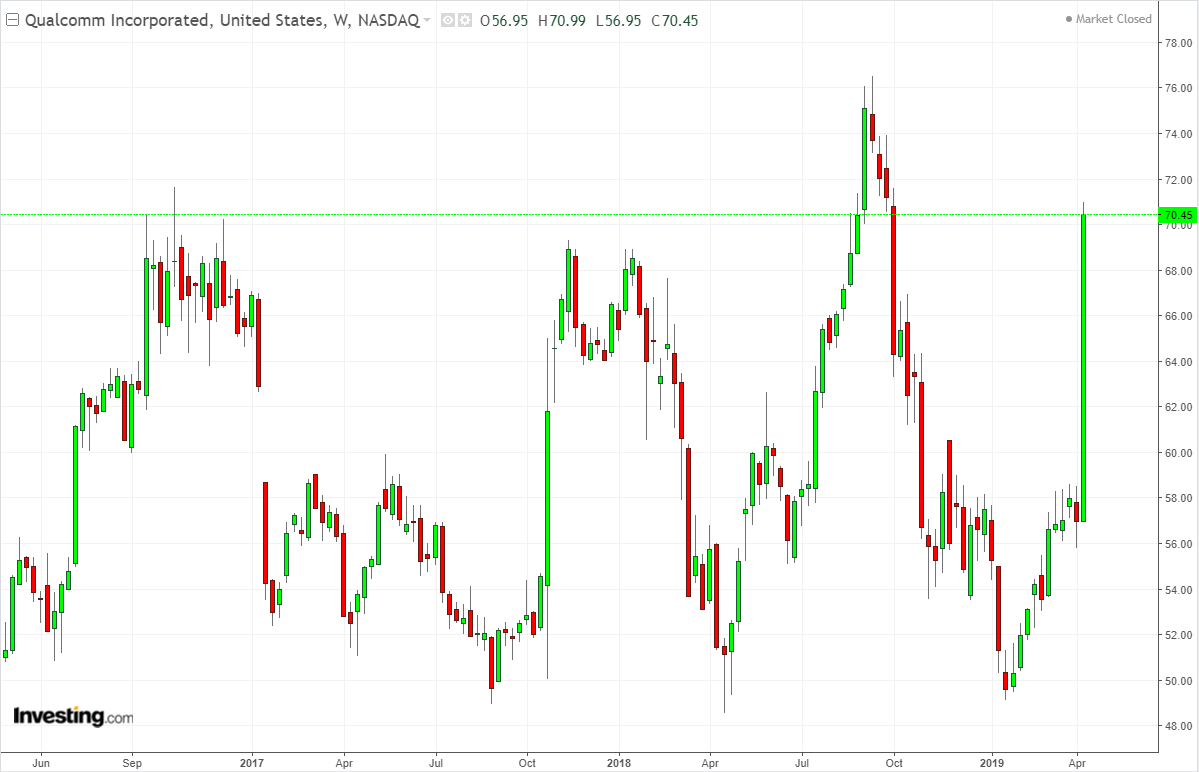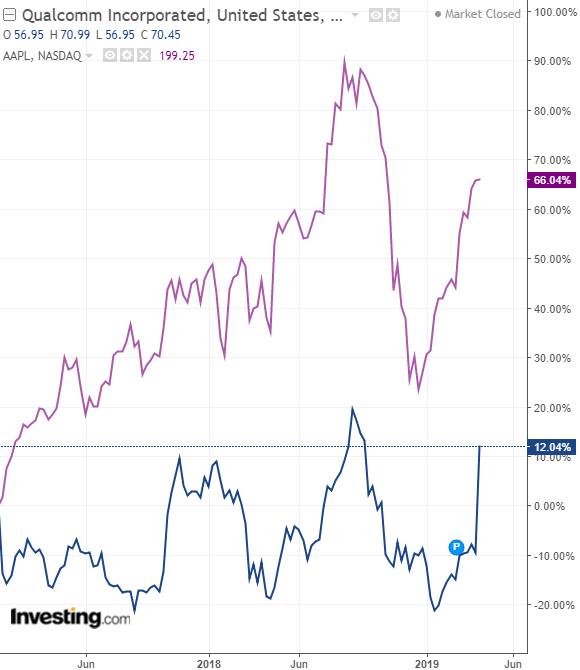After a bruising, two plus years of litigation, Apple (NASDAQ:AAPL) and chipmaker Qualcomm (NASDAQ:QCOM) surprised markets yesterday by settling their differences out of court just hours after the long-awaited trial kicked off. Though Apple shares didn’t react to the news, Qualcomm’s stock skyrocketed, gaining 31%, including a 6% hike in after hours trading.

Chart powered by TradingView
The original lawsuit, filed in January 2017, alleged that Apple was violating Qualcomm patents by not paying royalties; Apple—which at the time was one of Qualcomm's biggest customers—claimed that for years they'd been overcharged on those patents. In addition, Apple asserted that Qualcomm was using unfair business practices, including leveraging its position as a leading manufacturer of baseband chips, to prevent customers from sourcing parts from competitive suppliers, thereby requiring customers to license Qualcomm’s patents to get access to its chips. In this way the chipmaker was garnering revenue from both chips sales and patent licensing.
A lawsuit brought by a company's most significant client is no small thing, perhaps moreso when that customer is the closely followed, high profile manufacturer of the iconic iPhone.

Chart powered by TradingView
Indeed, the past two years have been extremely painful for Qualcomm. From the perspective of its share price, Qualcomm's stock spent most of the past two years trading below the $65 level where it had been when the the lawsuit hit. During that period, shares sank as low as $49, a loss of 25%.
Apple on the other hand, continued its upward trajectory during that same period and even became the first company to reach a valuation of $1 trillion.
Why was this lawsuit so much more damaging to Qualcomm than to Apple? From a fundamental point of view, licensing revenues are a major part of Qualcomm’s business model, and Apple was threatening to completely scupper those revenues by having the court dismantle Qualcomm’s business model.
Apple also withheld around $8 billion from Qualcomm while the suit was in progress, while it looked elsewhere for components for its iPhone, choking Qualcomm’s revenue which fell by 20% in its fiscal Q1 2019 compared to the same quarter a year prior.
Details of the settlement are still unclear. Both companies issued brief press releases indicating that Apple had ceased all its ongoing litigation against Qualcomm and that the two companies have reached a six-year licensing agreement, a multiyear chipset supply agreement, and that the settlement included an undisclosed payment from Apple to Qualcomm. Qualcomm said the agreement is likely to add about $2 of earnings per share.
If Apple was barely affected by the dispute, why the sudden settlement? The answer: Qualcomm’s dominance in the 5G mobile technology arena.
The successor to current 4G, the newer 5G technology enables much faster transfer of data between phones and cell towers, allowing speedier internet connection on mobile devices. Even more significant, perhaps, Qualcomm, is one of just a handful of companies (along with Huawei (SZ:002502), MediaTek (TW:2454), and Samsung (KS:005930)) that offers chips with 5G capabilities.
As a global leader in smartphone innovation, unless Apple begins developing their own modem chips, they need Qualcomm as much as the chip manufacturer needs them. Apple cannot allow its devices to lag the competition on anything, most especially on internet speed, and Samsung's new Galaxy S10 5G is already on the 5G track.
Yesterday's settlement allows Apple to return to business as usual without additional distractions. On the other hand, Qualcomm's future looks much brighter now.
With its biggest customer back, revenue and earnings should get a serious boost. Plus, right after the settlement was announced, Intel (NASDAQ:INTC) said it was dropping out of the 5G race, leaving Qualcomm as the sole, major 5G player. Now that it's legal problems are resolved, we believe $100 per share is well within Qualcomm's reach.
